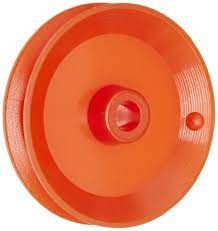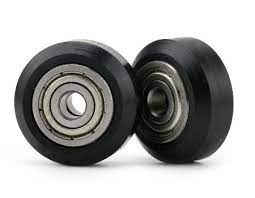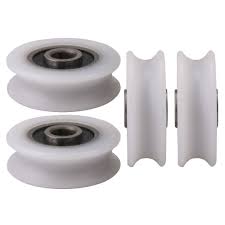Product Description
multiple-groove Plastic Nylon Pulley
Description:
Nylon PA6 Products that made the with 100% Virgin Raw Material by HangZhou Engineering Plastics Industries (Group) Company, has the best performance, such as: very tough, even at low temperatures, and high hardness in the surface, toughness, mechanical lower shock, and abrasion resistance. Combined with these characteristics and good insulation, and chemical properties, it has become common-level materials. Its widely used in a variety of mechanical structures and spare parts. Nylon PA6 products that made by HangZhou Engineering Plastics Industries (Group) Company, has the higher hardness, rigidity, a good resistance to wear and heat deflection temperature.
Advantages:
1. Good Tensile strength;
2. High impact and notching impact strength;
3. High heat deflection temperature ;
4. High strength and stiffness;
5. Good glide and limp home characters;
6. Good chemical stability against organic solvents and fuels;
7. Resistant to thermal aging (applicable temperature between -50°C and 110°C;
8. Size alternation by humidity absorption must be considered;
The parameter list of Plastic Nylon Pulley
| Model |
Plastic Nylon Pulley |
| Material |
Nylon,MC Nylon,PA,PA6,PA66 or customized |
| Thickness | 5~10mm or customized |
| Size | 50~200mm or customized |
| Color | Natural,black,white,blue, redect. |
| OEM & ODM | Yes |
| Certification | ISO9001,SGS,FDA,RoHS,Test Report,ect. |
| Free Sample | Yes |
| Density | 1.2g/cm3 |
| Shape | sheet, rod, tube, gear, pulley, guide rail……or according to your drawing |
| Packing | Plastic bags,Cartons,Wodden case,Pallet,Container,ect. |
| Advantage | 1.One stop procurement
2.A complete range of specification 3.free design offer OEM & ODM 4.free sample available 5.professional service team 6.specialize CNC machining and injection over 10 years 7.Custom accept as per drawing or sample |
| Certification: | ISO |
|---|---|
| Pulley Sizes: | Nylon Belt Pulley |
| Manufacturing Process: | Casting |
| Material: | Nylon Belt Pulley |
| Surface Treatment: | Electroplating |
| Application: | Chemical Industry, Grain Transport, Mining Transport, Power Plant |
| Samples: |
US$ 2/Piece
1 Piece(Min.Order) | |
|---|
| Customization: |
Available
| Customized Request |
|---|

Can plastic pulleys withstand exposure to environmental conditions?
Plastic pulleys are designed to withstand exposure to various environmental conditions. Here’s a detailed explanation:
1. Moisture and Humidity:
Plastic pulleys are typically made from materials that are resistant to moisture and humidity. They have inherent properties that prevent water absorption, reducing the risk of swelling, warping, or degradation. This makes plastic pulleys suitable for use in environments with high humidity or where occasional exposure to moisture is expected, such as garages or outdoor applications.
2. Temperature Extremes:
Plastic pulleys exhibit different levels of temperature resistance depending on the specific material used. Many plastic pulleys are designed to withstand a wide range of temperatures, including both high and low extremes. For example, some pulleys made from engineering-grade plastics can operate reliably in temperatures ranging from -40°C to 100°C (-40°F to 212°F). However, it’s important to check the manufacturer’s specifications for temperature limits and choose pulleys that are suitable for the specific environment in which they will be used.
3. UV Exposure:
Extended exposure to ultraviolet (UV) radiation from the sun can potentially degrade certain types of plastics. However, many plastic pulleys are manufactured with UV stabilizers or additives that provide resistance to UV radiation. These additives help protect the plastic material from UV-induced degradation, such as discoloration, brittleness, or loss of mechanical properties. Plastic pulleys with UV resistance are commonly used in outdoor applications where they are exposed to direct sunlight.
4. Chemical Resistance:
The chemical resistance of plastic pulleys varies depending on the specific material used. Some plastics, such as polypropylene (PP) or polyethylene (PE), have excellent chemical resistance and can withstand exposure to a wide range of chemicals, including solvents, acids, and alkalis. However, other plastics may be more susceptible to chemical attack. It’s important to consider the specific chemicals present in the environment and select plastic pulleys that are compatible and resistant to those substances.
5. Dust and Dirt:
Plastic pulleys are generally resistant to dust and dirt accumulation. Their smooth surfaces and low-friction properties make it difficult for particles to adhere to the pulley’s surface. This reduces the risk of debris interfering with the pulley’s movement or causing excessive wear. However, periodic cleaning may still be necessary to ensure optimal performance and prevent any buildup of contaminants that could affect the pulley’s operation.
6. Impact and Vibration:
Plastic pulleys are designed to withstand the impact and vibration commonly encountered in various applications. The plastic materials used in their construction offer good impact resistance, absorbing and dispersing energy to prevent damage or failure. Additionally, plastic pulleys can dampen vibrations, reducing the strain on the pulley and other components of the system. However, it’s important to choose pulleys with the appropriate material properties and consider the specific impact and vibration levels of the application.
7. Saltwater and Corrosive Environments:
In environments where saltwater or corrosive substances are present, it’s crucial to select plastic pulleys that are specifically designed for such conditions. Certain plastics, such as acetal (POM) or polyvinyl chloride (PVC), offer good resistance to saltwater and corrosion. These materials are commonly used in marine or coastal applications where the pulleys may be exposed to saltwater spray or corrosive atmospheres.
While plastic pulleys are generally designed to withstand exposure to environmental conditions, it’s important to consider the specific requirements of the application and choose pulleys that are suitable for the intended environment. Manufacturers often provide guidance on the recommended materials and specifications for plastic pulleys based on their environmental resistance properties.

Can plastic pulleys be customized for specific machinery and equipment?
Yes, plastic pulleys can be customized to meet the specific requirements of machinery and equipment. Here’s a detailed explanation:
Plastic pulleys offer a high degree of design flexibility, allowing for customization to match the needs of different machinery and equipment. Here are some key points regarding the customization of plastic pulleys:
1. Material Selection:
Plastic pulleys can be manufactured using various types of plastics, such as nylon, polyethylene, acetal (POM), or polyurethane. The choice of material depends on the specific application requirements, including factors like load capacity, wear resistance, chemical resistance, temperature tolerance, and desired friction properties. Different materials can be selected to optimize the performance and durability of the pulley in the given machinery or equipment.
2. Shape and Size:
The shape and size of plastic pulleys can be customized to fit the available space and interface with other components in the machinery or equipment. Manufacturers can design pulleys with specific dimensions, such as diameter, width, and bore size, to ensure proper alignment, belt or chain engagement, and tension. Customized shapes can include flanges, grooves, or other features that facilitate efficient power transmission and enhance the overall functionality of the machinery or equipment.
3. Mounting Options:
Plastic pulleys can be customized with different mounting options to suit the specific requirements of machinery or equipment. Mounting options can include bores, keyways, set screws, or other mechanisms that enable secure attachment to shafts or other rotating components. Customized mounting options ensure proper installation and alignment of the pulleys, contributing to reliable and efficient operation.
4. Groove Configuration:
In belt-driven systems, plastic pulleys can be customized with different groove configurations to accommodate specific belt profiles. Pulleys can be designed with V-grooves, flat grooves, or multi-groove profiles, depending on the type of belt being used. Customized groove configurations ensure optimal belt engagement, tracking, and power transmission, minimizing slippage and maximizing efficiency in the machinery or equipment.
5. Surface Finish:
The surface finish of plastic pulleys can be customized to meet specific requirements. This includes factors such as roughness, texture, or the addition of coatings or treatments. For example, pulley surfaces can be polished or coated to reduce friction, improve wear resistance, or enhance corrosion resistance. Customized surface finishes help optimize the performance and longevity of plastic pulleys in the machinery or equipment.
6. Load Capacity and Reinforcement:
If the machinery or equipment operates under heavy loads or high-stress conditions, plastic pulleys can be customized to enhance their load-carrying capacity. Reinforcing elements, such as fibers or fillers, can be added to the plastic material to increase strength and improve overall durability. Customized reinforcement ensures that the plastic pulleys can withstand the specific loads and forces encountered in the machinery or equipment.
7. Application-Specific Requirements:
Plastic pulleys can be customized to meet application-specific requirements. For example, in food processing equipment, the pulleys may need to comply with specific hygiene standards, such as being made from food-grade materials that are easy to clean. In corrosive environments, the pulleys can be customized to exhibit enhanced chemical resistance. Customization allows plastic pulleys to be tailored to the unique demands of different machinery and equipment.
Overall, plastic pulleys can be customized in terms of material selection, shape and size, mounting options, groove configuration, surface finish, load capacity, and meeting application-specific requirements. This customization ensures that the plastic pulleys seamlessly integrate into the machinery or equipment, providing optimal performance, durability, and reliability in their intended applications.

Can you explain the key features and advantages of plastic pulleys?
Plastic pulleys offer several key features and advantages that make them suitable for various applications. Here’s a detailed explanation of the key features and advantages of plastic pulleys:
1. Lightweight:
One of the significant features of plastic pulleys is their lightweight construction. Compared to metal pulleys, plastic pulleys are considerably lighter, which can be advantageous in applications where weight reduction is desired. The lightweight nature of plastic pulleys makes them suitable for applications where minimizing overall system weight is important, such as in portable devices or equipment.
2. Corrosion Resistance:
Plastic pulleys are inherently resistant to corrosion. Unlike metal pulleys that may rust or corrode when exposed to moisture or certain chemicals, plastic pulleys maintain their integrity and functionality even in corrosive environments. This corrosion resistance makes plastic pulleys suitable for applications where exposure to moisture or chemicals is likely, such as in marine equipment or outdoor machinery.
3. Low Friction:
Plastic pulleys generally have low friction coefficients. This means that the contact between the pulley and the associated components, such as belts or ropes, is smoother, resulting in reduced frictional losses. The low friction properties of plastic pulleys contribute to improved efficiency and energy savings in various systems, such as conveyor belts, where reducing power consumption is desirable.
4. Noise Reduction:
Plastic pulleys offer inherent damping properties, which help reduce noise and vibration during operation. The damping effect of plastic materials absorbs vibrations and minimizes noise generation, resulting in quieter operation compared to metal pulleys. This makes plastic pulleys suitable for applications where noise reduction is important, such as in household appliances or office equipment.
5. Design Flexibility:
Plastic pulleys offer a high degree of design flexibility. They can be molded into various shapes, sizes, and configurations, allowing for precise customization. This flexibility in design enables specific features, such as flanges, grooves, or mounting options, to be incorporated directly into the pulley. Plastic pulleys can be tailored to meet the unique requirements of different applications, making them highly versatile in terms of design possibilities.
6. Cost-Effective:
Plastic pulleys are generally more cost-effective compared to pulleys made from other materials, such as metal, ceramic, or glass. The manufacturing process for plastic pulleys is typically less complex and less expensive, resulting in lower production costs. This cost advantage makes plastic pulleys a cost-effective choice for a wide range of applications, especially in situations where budget constraints are a consideration.
7. Electrical Insulation:
Plastic pulleys offer electrical insulation properties. Unlike metal pulleys that conduct electricity, plastic pulleys act as insulators, preventing the flow of electrical current. This electrical insulation characteristic is advantageous in applications where electrical conductivity needs to be avoided or isolated, such as in electronic devices or systems with sensitive electrical components.
8. Chemical Resistance:
Plastic pulleys exhibit resistance to various chemicals, depending on the specific plastic material used. They can withstand exposure to substances such as oils, fuels, solvents, and acids without degradation. This chemical resistance makes plastic pulleys suitable for applications where contact with chemicals or aggressive substances is expected, such as in industrial machinery or chemical processing equipment.
In summary, plastic pulleys offer key features and advantages including lightweight construction, corrosion resistance, low friction, noise reduction, design flexibility, cost-effectiveness, electrical insulation, and chemical resistance. These attributes make plastic pulleys suitable for a wide range of applications across industries such as automotive, consumer electronics, manufacturing, and more.


editor by CX
2023-12-11